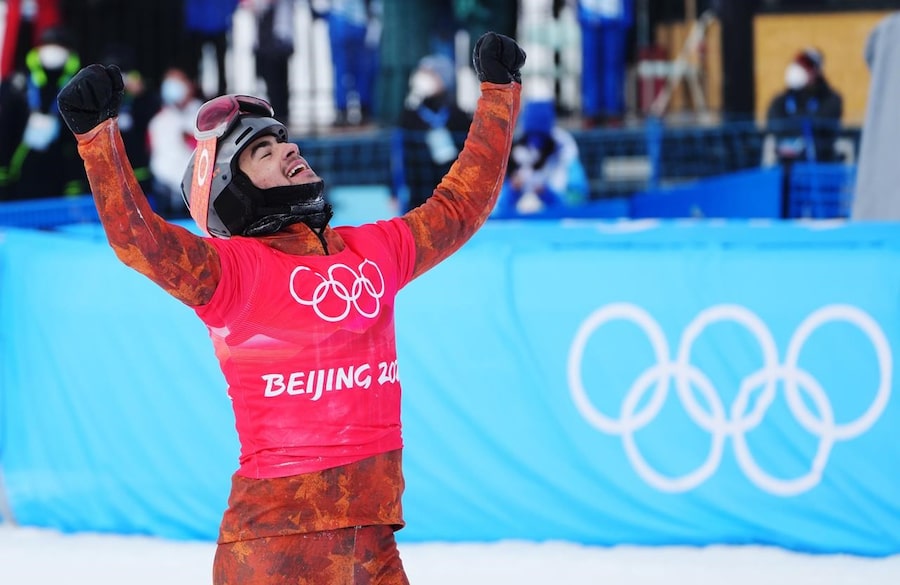Bronze medallist Max Parrot of Canada celebrates with his teammate after the men's snowboard big air final at the Beijing Olympics on Feb. 15, 2022.FABRIZIO BENSCH/Reuters
In a quiet moment after the podium ceremony, Chinese phenom Su Yiming told Canada’s Max Parrot he’d been one of his idols for years.
The Canadian had been a big reason why he’d worked so hard heading into the Beijing Olympics, Su told Parrot.
In snowboarding’s big air final at the Beijing Olympics, Parrot captured the bronze medal about a week after winning gold in slopestyle.
But it was the 17-year-old Su who put on a clinic to clinch big air gold, landing front- and backside 1800s on his first two jumps that smothered any questions about judging that had plagued the slopestyle event. Su didn’t even need a third jump – to the delight of several hundred Chinese fans cheering him on, he soared off the ramp and did one slow celebratory rotation.
“Two years ago, I didn’t even know [Su],” said Parrot, who waved to Su’s family among the crowd at Big Air Shougang venue.
“Su said because of me he’s been pushing really hard. I told him ‘Well, now you’re going to make me push really hard,’” Parrot added, with a laugh.
The 27-year-old from Bromont, Que., fell on his first jump, but landed a huge cab 1800 on his second attempt. His 1620 on his third jump was enough to get him on the medal podium.
Mons Roisland of Norway won the silver, passing Parrot on his final jump.

Canada's Max Parrot takes his first run during the men's snowboarding big air final at the Beijing Olympics, on Feb. 15.The Canadian Press
Mark McMorris of Regina was 10th, while Darcy Sharpe of Comox Valley, B.C., was 12th.
Anna Gasser of Austria won the women’s event earlier in the day. Canada’s Jasmine Baird and Laurie Blouin were seventh and eighth, respectively.
Parrot soared to slopestyle gold on Feb. 7, three years to the day since he began 12 rounds of chemotherapy to treat Hodgkin lymphoma. When asked if dreaming of the Olympics helped him get through the tough days battling cancer, he said, “I was mostly just thinking about making it to tomorrow. For six months.”
Parrot said snowboarding has been on “my mind 24/7″ since he took up the sport at nine years old. Being off the slopes during his treatment was devastating.
“When something takes your passion away for six months of your life, you have to put it in a closet, it’s hard … since I was 16 years old, I’m travelling the whole world every year, snowboarding every day, and now you have to stop for six months,” he said. “I just really wished I was going to be able one day to snowboard again.
“Snowboarding definitely kept me motivated on those hardest days, the days that I actually wanted to give up.”
McMorris, meanwhile, played it safe Tuesday with a 1620 on his first jump, but fell on an 1800 on his second, setting himself up for a do-or-die third attempt. He went for a quad cork 1800, flying nine metres in the air, but fell on the landing.
“Big air doesn’t have my heart the way slopestyle does, but man, I’m happy we get to compete at two events at the Olympics,” McMorris said. “Happy to make finals in both. Happy to go home tomorrow with a medal and just get out and start riding powder again. All over this hard stuff.”
McMorris, who’s been one of the sport’s biggest stars for the better part of a decade, was asked about competing amid the threat of COVID-19 and all the safety restrictions. Getting to Beijing with all the protocols, he said, was the toughest part.
“But once we were here it’s kind of like sports prison,” he said. “You’re just chilling. You don’t do anything. Which isn’t that bad, you get lots of rest, hanging out. Happy with how things went – obviously today’s a little frustrating. It’ll burn for a little bit.”
Canada’s reigning men’s big air champion, Sebastien Toutant, wasn’t able to defend his title Tuesday after falling twice in the qualifier a night earlier.
The big air event didn’t have the judging drama of the slopestyle event, which saw McMorris question the scoring, saying he thought he’d had the best run of the day. Video showed Parrot committed an error the judges failed to spot. McMorris apologized to Parrot a couple of days later for his comments.
McMorris applauded his teammate for his podium performance in big air.
“Max did great,” he said. “To fall on his first run and come back and get two lands, really impressive. … He should be super stoked.”
Still, the judging issue was a theme of Tuesday’s postcompetition media interviews.
McMorris said snowboarders are just lucky to have industry and pro tour outside of Olympic competition where they can enjoy successful careers.
“These judges aren’t full-time,” he said. “They’re trying their best and you’ve got to applaud them for that. There were some bobbles these Games. But they’re trying. Just like us. We have a lot of pressure, sometimes you fall like I had, and sometimes they made mistakes, too.”
Parrot pointed out that judged sports sometimes work in your favour and sometimes don’t.
“I remember a lot of times that I thought I should have won and didn’t,” he said. “I chose snowboarding because I love the sport, and it is a judged sport, so if you don’t like it, go for a timed sport. It’s part of snowboarding, and I love snowboarding.”
The women’s event was considered one of the finest big air finals ever, and Baird, a 22-year-old from Georgetown, Ont., was happy to have a front-row seat.
“These girls are showing everyone what women’s snowboarding is all about and we’re just seeing so much progression,” Baird said. “It’s really, really great to see. These girls aren’t scared of anything, they’re going to keep pushing and pushing and I’m hoping to keep progressing myself, too.
“It’s really, really sick to see. I’m so happy to be here and be a part of it, see it in person.”
Gasser, the oldest woman in the field at 30, executed a huge cab 1260 on her final jump to overtake Zoi Sadowsky Synnott of New Zealand and capture her second consecutive Olympic gold. Kokomo Murase of Japan won the bronze.
Blouin, a 27-year-old from Quebec City, fell on her first jump, then landed a front-side double cork 1080 to put her in medal contention on her second. But a fall on her third jump meant there’d be no podium finish.
“On the last jump, I had a little more pressure,” she said. “Honestly, I can’t tell what happened because I felt good in the air.”
The points from the boarders’ two best jumps are added together for a final tally.
Blouin, who won silver four years ago in Pyeongchang, narrowly missed a medal in the slopestyle on Feb. 5, finishing fourth.
“It’s okay,” she said of her big air result. “It doesn’t feel as bad as finishing fourth.”
The Big Air Shougang venue is one of the most unique of these Games. Built on an abandoned steel mill that stretches for several blocks, the monolithic cooling towers make for a striking backdrop and have drawn comparisons to the nuclear power plant on The Simpsons. It resembles a giant stiletto when lit up at night.
It’s the only permanent big air structure in the world and stands 60-metres high and 160-metres long.
Our Olympic team will be writing a daily newsletter to land in your inbox every morning during the Games. Sign up today to join us in keeping up with medals, events and other news.








